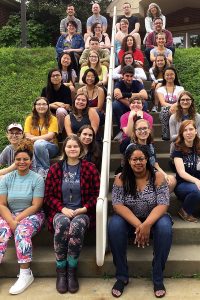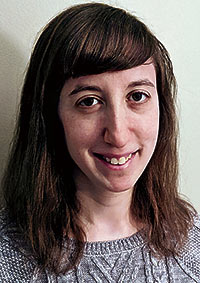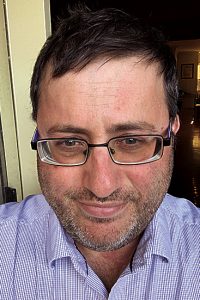C.L. Clark: Hope and Tragedy

CHERAE LICHELLE CLARK was born August 10, 1990 in Oklahoma and grew up in Kansas City KS. She attended international school just outside London, England, then attended the University of Kansas as an undergrad. She earned her MFA at the University of Indiana, and was a 2012 Lambda Literary Fellow under Dorothy Allison. Clark has worked as an English teacher, editor, and personal trainer. She lives in the UK.
Clark began publishing work of genre interest with “Sisyphus” (2018), and several stories have appeared since in major magazines. “You Perfect, Broken Thing” (2020) won an Ignyte Award for best short story.
Debut novel The Unbroken appeared in 2021 and was nominated for Ignyte, British Fantasy, and Nebula Awards. It launched the Magic of the Lost trilogy, which includes The Faithless (2023) and a forthcoming final volume. Standalone novel Warmongers is also forthcoming, along with novella Fate’s Bane.
Clark was an editor at Podcastle from 2019-21, and co-edited the Ignyte and Locus Award winner We’re Here: The Best Queer Speculative Fiction 2020 with Charles Payseur (2021).
Excerpt from the interview:
“One of the things I’m exploring a lot is what happens when you are given power. In The Faithless, Touraine realizes that she has a lot of influence now, not just as one of the heroes of the revolution – she becomes part of the ruling council in Qazāl – but she also eventually goes to Balladaire and has privilege as an ambassador, and also as a friend of the princess; she has the ear of the future queen. She’s living in the palace, this is stuff she’s never dreamed of. She’s making friends with nobles, so all the while she’s got all this stuff she thought she would never have access to that she’s been craving all her life. A lot of this book and the next is about who you become when you are given that power, and when you could leave everybody behind, do you? Or do you bring them with you? If so, how? It’s the next step, for me, in terms of complicity and complacency in that situation.
“I started The Unbroken in 2012, and I rewrote it five times before I finally got representation, and then did another rewrite with the editor who bought it. I love that book. I refused to put it down despite the rejections I was getting from agents, because I knew there was something really important about it to me. And yet, when I go back and look at it, I also see things I would like to change, or would like to dive a little bit deeper into, or certain consequences I wish I could have explored.
“The biggest problem was I didn’t quite have the confidence. I was just so excited to be published that I was like, ‘Okay, this is great. I don’t need to do this again; I don’t need to read it one more time through a second round of copy edits.’ I’ve changed my mind since then, strangely enough. Even though I have less time to work on each book now that I’m in these rolling contracts, I have become even more attentive to language and cohesiveness, partly because I know there’s a good chance I will not get another opportunity to redo things.
“If given the choice, I would rather do something slow and correct. My dad, when I was a kid, would get mad at me for not putting my dishes straight into the dishwasher. He would always tell me, ‘Touch it once.’ It’s the idea of ‘measure twice, cut once.’ ‘Touch it once – if you’re going to do it, do it right the first time.’ I don’t think about writing in terms of first drafts or anything, but the entire process: this is the one time I’m going to write this book, so I’ll do it as well as I possibly can. This is a little bit of ego talking, but I am good at what I do, so there is no reason that the best I can do should be a shoddy thing. Part of that means I’ve leveled up – not necessarily just in my craft, but in the craft of saying ‘no.’ There are only so many things I can do, so I don’t do as much editing work anymore. I’ve wrapped up all my editing projects. I had to stop doing Podcastle, because I knew I really wanted to focus on the writing, and because of the projects I knew I was taking on, I just needed more time.
“Also, I’m much more prepared to tell editors, ‘No, you will not get this at that time.’ Especially because editors are also taking their time getting things back to me, so I’m not as willing, anymore, to rush something out the door from fear or nervousness, feeling like I’m so small that they’ll just forget about me if I don’t hurry and rush this out.
“With The Unbroken, I didn’t really know how to outline. I have not become a strict outliner, but I definitely start with an outline now because it’s the best way for me to get my thoughts on the page. I may deviate very strongly from the outline once things start going, but it gets certain tentpole ideas on the page so I know what kind of story I want to be writing. I’m not going to say that, miraculously, every novel is going to be easy, but it was definitely easier going from The Unbroken to The Faithless and then from The Faithless to the third book.
“I don’t know what it’s going to be like writing Warmongers, which is a standalone, because I’ve never written a standalone before – I’ve never needed to close all the doors the first time around. I honestly think it will be much easier than writing a full trilogy, but because of what I’ve learned in the process of writing all three, I am more able to do the hard work at a moderate pace.
“Something I am still worried about now is: ‘Is this rushed?’ I don’t think my process – or my publishing schedule – necessarily gives me enough time to think about the problems that I want to tackle. The war-industrial process isn’t something you think about for a few months, knock out a book in the next month, and then you’re done. That’s why I’m just going to keep writing the same book over and over again from different angles, because it’s the only way I can get everything out. But I do want to take my time, and sometimes I wonder if I should take another ten years to write a book, just so I can give it the kind of thought it deserves. That’s a fear I have. Writers are supposed to talk about what they’re afraid of in the reception of their work, but I prefer to be very thoughtful about my work, especially because I’m dealing with such heavy-hitting, world-based topics that I have a lot of stake in, and I know other people have a lot of stake in. I just went to make sure those subjects are given the time that they’re owed.
Interview design by Stephen H. Segal
Read the full interview in the April 2023 issue of Locus.
 While you are here, please take a moment to support Locus with a one-time or recurring donation. We rely on reader donations to keep the magazine and site going, and would like to keep the site paywall free, but WE NEED YOUR FINANCIAL SUPPORT to continue quality coverage of the science fiction and fantasy field.
While you are here, please take a moment to support Locus with a one-time or recurring donation. We rely on reader donations to keep the magazine and site going, and would like to keep the site paywall free, but WE NEED YOUR FINANCIAL SUPPORT to continue quality coverage of the science fiction and fantasy field.
©Locus Magazine. Copyrighted material may not be republished without permission of LSFF.







